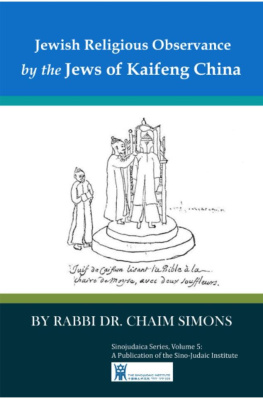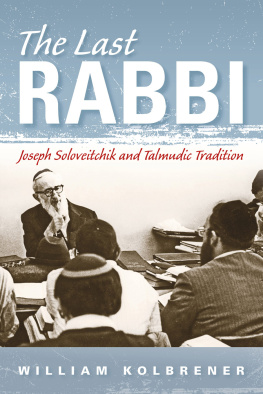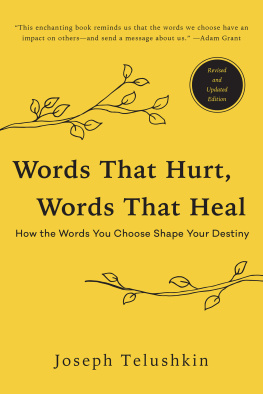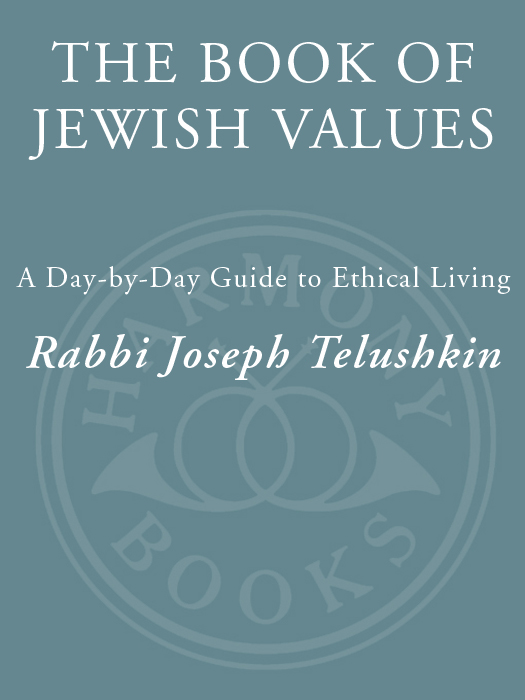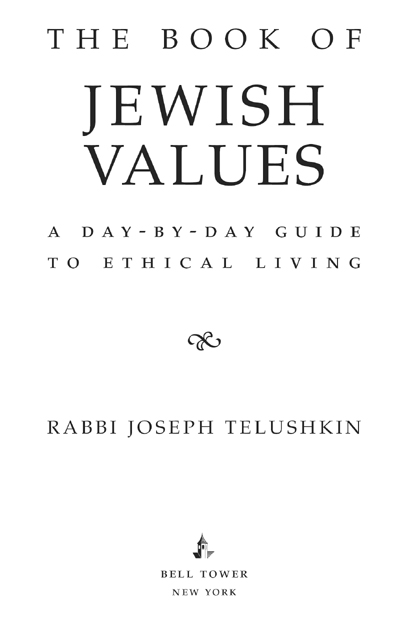ALSO BY R ABBI J OSEPH T ELUSHKIN
NONFICTION
The Nine Questions People Ask About Judaism (with Dennis Prager)
Why the Jews?: The Reason for Antisemitism (with Dennis Prager)
Jewish Literacy: The Most Important Things to Know About the Jewish Religion, Its People, and Its History
Jewish Humor: What the Best Jewish Jokes Say About the Jews
Jewish Wisdom: Ethical, Spiritual, and Historical Lessons from the Great Works and Thinkers
Words That Hurt, Words That Heal: How to Use Words Wisely and Well
Biblical Literacy: The Most Important People, Events, and Ideas of the Hebrew Bible
FICTION
The Unorthodox Murder of Rabbi Wahl
The Final Analysis of Dr. Stark
An Eye for an Eye
Acknowledgment for permission to reprint previously published material is found on .
Copyright 2000 by Rabbi Joseph Telushkin
All rights reserved. No part of this book may be reproduced or transmitted in any form or by any means, electronic or mechanical, or by any information storage and retrieval system, without permission in writing from the publisher.
Published by Bell Tower,
New York, New York.
Member of the Crown Publishing Group.
Random House, Inc. New York, Toronto, London, Sydney, Auckland www.randomhouse.com
Bell Tower and colophon are registered trademarks of Random House, Inc.
Library of Congress Cataloging-in-Publication Data
Telushkin, Joseph, 1948
The book of Jewish values: a day-by-day guide to ethical living/
Joseph Telushkin. 1st ed.
1. Ethics, Jewish. 2. Conduct of life. 3. Jewish way of life.
I. Title
BJ1285.T45 2000
296.36dc21 99-34021
eISBN: 978-0-307-79445-1
v3.1
For my beloved wife and children
Dvorah,
Rebecca, Naomi, Shira, and Benjamin.
Acknowledgments

Several friends and colleagues generously gave of their time to read drafts of this book. Along with providing encouragement and stylistic and editorial advice, they also critiqued entries that they felt were not working, which led me to rework many chapters, expand others, and drop some. I feel blessed by God to have such devoted and intelligent friends, and am particularly pleased to acknowledge publicly the contributions of Rabbi Irwin Kula, Daniel Taub, Dr. Stephen Marmer, Rabbi David Woznica, Rabbi Hanoch Teller, Allen Estrin, Rabbi Leonid Feldman, Larry Gellman, and my beloved wife and fellow writer, Dvorah Telushkin. I would also like to thank Rabbi Israel Stein for reviewing and verifying the many hundreds of sources cited and David Wade Smith for his excellent job of copyediting.
Rabbi Dr. Michael Berger of Emory University, a friend and a Jewish scholar of wide-ranging knowledge, read The Book of Jewish Values in its entirety. He challenged my thinking and my conclusions when he thought they were wrong or overstated, and suggested sources I had overlooked. I am deeply grateful to him for enriching this manuscript, as he has done with several of my earlier books.
David Szonyi has edited my last six books. Each time I entrust him with manuscript pages, I am taken aback and humbled by how many stylistic and editorial improvements he makes. As I have noted before, David is a blessing to any writer.
About two dozen of the more than three hundred short chapters in The Book of Jewish Values draw heavily on the works of other writers, several of whom are dear friends. I acknowledge with thanks Dennis Prager, Rabbi Abraham Twerski, M. D., Yitta Halberstam Mandelbaum, Rabbi Hanoch Teller, and Rabbi Jack Riemer for granting me permission to quote from their booksworks that have profoundly affected me and which I hope, in turn, will so affect you. I am also grateful to the other writers and publishers who granted me permission to quote from their writings.
I am particularly grateful to David Zerner for his belief in this project and his generous support of it and of an additional project I am undertaking in further developing the study of Jewish ethics and its applicability to daily behavior. David is a man of great ethical integrity, committed to Judaism and the Jewish community, and to the importance of Jewish study. I am honored to have known him now for the past twenty years. I wish to thank as well for their support his wife, Lillian, his daughters, Donna, and Sandra Zerner, Rabbi Tirzah Firestone, and David Friedman.
I am grateful as well to my congregation, the Synagogue for the Performing Arts in Los Angeles, whose beloved members and wonderful, supportive leadership have given me the forum to develop many of the ideas in this book, and to CLAL, the National Jewish Center for Learning and Leadership, where I have served as an Associate since 1987. I am particularly happy to acknowledge two of the organizations professional leaders, Rabbi Irwin Kula, its president, and Donna Rosenthal, its executive vice-chairman, for their friendship and support. For over two decades, CLAL (founded by Rabbi Yitz Greenberg) and its extraordinary faculty and staff have played a major role in educating many of American Jewrys lay leadership in Jewish values. I believe that the impact of this organization, in raising the intellectual and moral quality of American Jewry, will continue to expand even more in the coming years.
Richard Pine has been my agent now for almost two decades, and my respect, admiration, and affection for him grow from year to year and book to book.
This is the first book on which I have worked with Toinette Lippe, my editor at Bell Tower, and the experience has been joyous. A woman of great literary and editorial discernment, she has made her enthusiasm for this project apparent since when she first read my proposal. As every writer knows, there are few things as inspirational and motivational to a writer as having an editor who believes in you and in the significance of your project.
The writing of The Book of Jewish Values has been particularly important to me. Most of my previous books have been devoted to explaining Judaism and its ideas to Jews and non-Jews. Although I always write as a strong believer in Judaism, my earlier books were largely descriptive, whereas this work is entirely devoted to advocacy, to presenting people with hundreds of lessons drawn from Jewish sources and scholars that teach one how to be a better person. In the course of writing this book, I know that I was often transformed and, I hope, elevated. The writing of The Book of Jewish Values became for me a holy act, an attempt to bring about a little of the perfection of the world under the rule of God for which Jews pray daily. If some of the lessons contained here influence you to practice goodness and kindness more actively and more imaginatively, I will feel more than amply compensated. Indeed, I thank you for reading this book.
Contents

Hillel used to say: If I am not for myself, who will be for me?
And if I am only for myself, what am I? And if not now, when?
Ethics of the Fathers 1:14
Introduction



